Ever since Benjamin Bratt exploded into the public consciousness in
the 1990s as a detective on the long-running series Law & Order,
he has been surprising us with his career choices.
Despite his leading man looks, Bratt was always drawn to grittier
fare. Therefore, while he has done his fair share of big
Hollywood films – like Miss Congeniality, Traffic and
recently Snitch – Bratt has also shown up in a lot of darker
independent films which take stark looks at some rather taboo
subjects.
The latest is writer/director Anita Doron's The Lesser Blessed,
based on the acclaimed by Richard Van Camp novel. Bratt plays
Jed, a modern native American living in Northwestern Canada who is
dating a local woman named Verna (Tamara Podemski) and acting as a
role model for her son Larry (Joel Nathan Evans), a local teen
outcast who is harboring a very dark secret.
A couple of weeks
before the release of The Lesser Blessed, Mr. Bratt sat down
with us for this exclusive discussion of the movie and his career.
Nice to interview
you again, I spoke with you a few years ago when you were working on
The
Cleaner. What was it about the script of The Lesser Blessed
that intrigued you?
As I began reading, it was immediately apparent that it
came from the hand of a true artist. It was at once beautiful and
raw, and painfully familiar with the awkward, often bittersweet
business of growing up as a teen. Honestly, it grabbed my attention
like a slap to the head. I was so startled by its humanity I had to
write Anita [Doron] a letter and tell her so. The coming of age journey of a
teenage outsider is a familiar trope, but I had never seen it done
with such brutal and tender honesty, let alone from a native [First
Nations] perspective. I loved that Larry’s story – his entire world
– was so culturally specific, yet utterly universal in its depiction
of teenage angst and isolation.
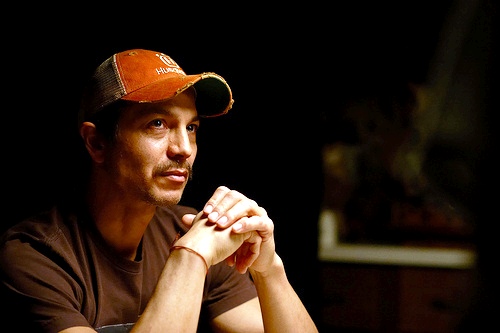 Your character
was pretty fascinating. When he first appears, the audience assumes
that they know who he is: the mother's selfish new boyfriend with
commitment issues, but it turns out that he is nothing like that at
all. Did the fact that he bucks the normal expectations make him a
more interesting character for you to play?
Your character
was pretty fascinating. When he first appears, the audience assumes
that they know who he is: the mother's selfish new boyfriend with
commitment issues, but it turns out that he is nothing like that at
all. Did the fact that he bucks the normal expectations make him a
more interesting character for you to play?
The truth is, I jokingly asked Anita if I was too old to
play Larry… the part is just that good! But Jed suited me just fine
and yes, as you say, part of what makes him compelling is that he
doesn’t fall into the category of the cold and indifferent
boyfriend. In fact, he emerges as the opposite. He becomes both the
moral and emotional anchor of the film.
Jed was an
interesting dichotomy, because professionally and personally he was
always trying to rescue lost people, and yet in some ways he was
lost himself. Jed obviously really cared for Verna and Larry, but sometimes
seemed
scared by the responsibility of a potential family. Do you think
that in helping Larry get through his issues, Jed will be able to
finally allow them fully into his life?
That’s an interesting takeaway from the film and I can see
why you might get that impression. There is much in the relationship
between Verna and Jed that is left to question. What I hope remains
clear is that Jed is really the only good man Larry
knows and trusts. As it turned out, Richard’s novel became a
treasure trove of information and insight, and I used it as a kind
of character bible. Anyone who knows anything about contemporary
native culture and some of the ongoing social ills that plaque our
communities – drug and alcohol abuse, fractured families, domestic
violence, incest, poverty, unusually high suicide rates –
understands Richard’s intention in the design of this character.
Jed is the kind of man that is desperately needed in many
of our troubled communities and is an even rarer find onscreen. He
is a renaissance man, a role model, a world traveler who has lived a
life of adventure and purpose, yet remains connected to what defines
him: His Indian-ness. He is contemporary yet still tied to his
traditional ways. He has humor and pathos, tenderness and strength.
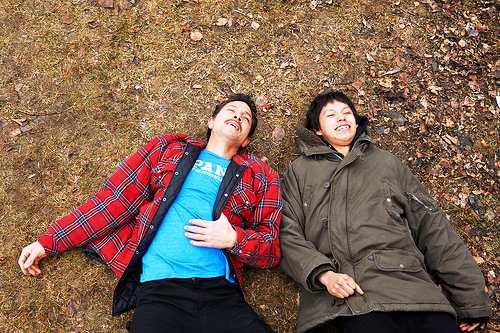 In the book, Larry views him as a kind of superman. His
hero worship of Jed is as heartbreaking as it is telling of his
emotional need for a reliable father figure. Larry sees Jed as good
for him and his mother both, but he also recognizes that it is Verna
who is afraid to get too close. After all, Verna is a casualty of
war wounded from years of mental and physical abuse at the hands of
Larry’s biological father and God knows what else. Her soul wound
has healed enough to allow her to recognize the goodness of Jed but
not enough to let him in completely. There is a sense at the end of
the film that in spite of the horrors of the past and the current
lingering demons of the present, these three may well find their way
to each other and likely to a place of… hope, I suppose.
In the book, Larry views him as a kind of superman. His
hero worship of Jed is as heartbreaking as it is telling of his
emotional need for a reliable father figure. Larry sees Jed as good
for him and his mother both, but he also recognizes that it is Verna
who is afraid to get too close. After all, Verna is a casualty of
war wounded from years of mental and physical abuse at the hands of
Larry’s biological father and God knows what else. Her soul wound
has healed enough to allow her to recognize the goodness of Jed but
not enough to let him in completely. There is a sense at the end of
the film that in spite of the horrors of the past and the current
lingering demons of the present, these three may well find their way
to each other and likely to a place of… hope, I suppose.
I believe this is
Joel Nathan Evans' first film, and both Kiowa Gordon and Chloe Rose
are also fairly new to the business. As the person who has been
working in TV and film the most, did you spend a lot of time with
them and give them suggestions?
I was shooting
Private Practice in Los Angeles when Lesser Blessed began
principle photography in Northern Ontario. I literally flew up on my
birthday over the Christmas break and worked only four days, the
final four days of filming, then went home. There was no hanging out
or time to even meet most folks; that night upon landing I went
right into a costume fitting and eight hours later I was on set. My
day one was the dinner table scene – a three page monologue, no
rehearsal, and go! No pressure there, right? Joel and Tamara [Podemski] were
already in their groove, as was the crew, so it was my job to come
in and make myself fall into step with their rhythm. That’s part of
the challenge, but actually, also part of the thrill.
How did working
with these young actors bring out the best in you as an actor?
Joel had pretty good instincts as a first-time performer
and it helped that he’s a bright young man. But the emotional heavy
lifting that his part required would challenge even the most
seasoned professional. Truly a once in a lifetime kind of role.
Anita was very good with him and gave him plenty of time and a warm
guiding hand. I think it also helped that inherent in our
relationship onscreen was a mentor/protégé thing happening, which
extended into our conversations off screen. Now thinking back on it,
it was a pretty organic process, and of course it also helps when
the writing is that good.
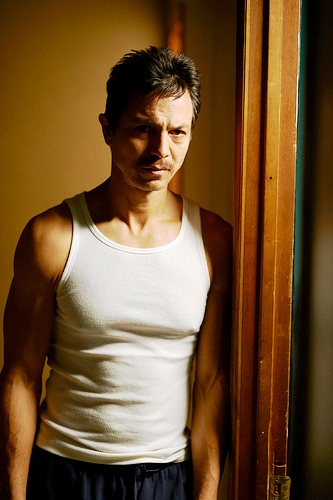 I've always
thought that you had fascinating taste in films. You are willing to
work on very small films that take on somewhat taboo subjects that
many Hollywood actors might never touch, like this film or
La Mission
or The Woodsman or even The Cleaner. What is it about
these small projects that take on touchy subjects that interests
you?
I've always
thought that you had fascinating taste in films. You are willing to
work on very small films that take on somewhat taboo subjects that
many Hollywood actors might never touch, like this film or
La Mission
or The Woodsman or even The Cleaner. What is it about
these small projects that take on touchy subjects that interests
you?
I find provocative material to be the most interesting to
work on, especially when it’s a challenging subject matter that
others might shy away from. The reward is in the risk. In the case
of La Mission, that was a deeply personal effort from
beginning to end. My brother Peter wrote it for me and we produced
it together under his direction. With the character of Che, we
wanted to explore the nature of a man – a bona fide, old-school
Latino in this case – who can’t yet see beyond his cultural and
societal conditioning. We wanted to peel back the layers and examine
what lies beneath his homophobia, his misogyny, his violence, and
ask what has to happen to bring about a move away from these things?
Anita is equally probing in her effort to get at the heart
of what makes Larry tick. The Lesser Blessed is filled with
cold, stark images and is unflinching in its portrayal of Larry’s
particular kind of hell. The reward in sticking with it lies in the
triumph of the human spirit, the power of love and hope even through
the most dire of circumstances.
You still also
pepper in roles in bigger Hollywood fare like
Snitch and
Love in the Time of Cholera and older stuff like Traffic
and Miss Congeniality. Do you enjoy doing bigger films as
well, or do you see those roles as a way to afford to do more
personal, smaller films?
Frankly, the reasons vary when it comes to deciding what to
do next. I think all actors wish for the luxury of being able to
pick and choose from the best material out there, but alas, that has
never been my lot. I’ve done many films for love – that is to say,
no money – and I have also done jobs that simply pay the bills.
Everything changes when you have children and practical decisions
must be weighed alongside artistic ones. That’s my reality. Of
course, the battle between artistic intention and the workman’s
imperative to keep food on the table is an ongoing internal struggle
for me. Listen, a close friend of mine is fond of saying, “There’s
no shame in making an honest living,” and he’s right at the end of
the day. I have to remind myself of that every once in a while.
At this stage of my life, it feels like I have found a
semblance of balance, but even that feels tentative in the face of
how the business is changing. The little gems are harder to find,
and there are more of us vying for the same roles because there are
less independent films being made. It’s a much different world than
it was even ten years ago, and if I want to continue working as an
actor, I find myself having to be more open minded than ever before.
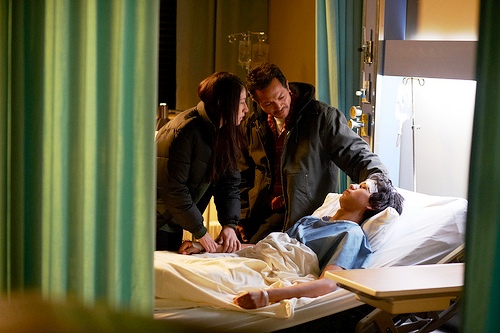 Lately you've
been doing voiceover work in
Cloudy With a Chance of Meatballs and Despicable Me 2. Is
voiceover work fun?
Lately you've
been doing voiceover work in
Cloudy With a Chance of Meatballs and Despicable Me 2. Is
voiceover work fun?
Ah, a case in point! Oh man, it’s ridiculous how much fun
it can be. And of course my cool quotient goes way up with my kids
because these are the films that they and their friends love to
watch over and over. “Nice work if you can get it,” as the song
goes…
As an actor, how
is it easier and how is it harder?
Different set of challenges, really. It’s very freeing to
go into a recording studio and just let it all fly. The only
downside is that you are usually working alone in a studio with the
director. There is no acting partner there to really play off of.
You have had a
recurring role on
Modern Family.
You tend to do more dramatic work, is it fun to do comedy again? Do
you find comedy easier or harder than drama?
Acting is acting… whether you’re doing comedy or drama.
They both require good instincts and some technique. I try not to
get too complicated when thinking about it. I will say that the
script read-throughs for the comedy jobs make for a much more
enjoyable day!
When you were
young, who were some of the actors who inspired you to go into show
business?
As a kid in the 70’s, I saw a lot of films. I grew up
watching a generation of actors that will never be matched again.
Gene Hackman, [Dustin] Hoffman, [Robert] Duvall, [Al] Pacino,
[Robert] De Niro, [Clint] Eastwood, [Paul] Newman. There was Michael Caine,
[Sean] Connery, [Charles] Bronson, Bruce Lee, Chief Dan
George, Steve McQueen, Charlton Heston, Warren Beatty, Richard
Pryor. The list is long and varied!
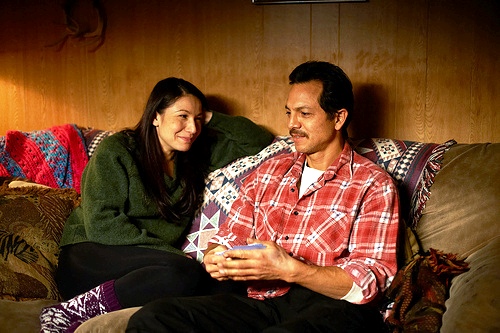 What was the
first film that you remember seeing which really wowed you?
What was the
first film that you remember seeing which really wowed you?
The original Planet of the Apes with Charlton Heston.
I remember my father piling us all into the station and going to the
drive-in to see it… and it freaked me out, as I recall. However, I
became fascinated with that series of films.
What movie would
you say you have seen more than anything else?
Probably a tie between The Outlaw Josey Wales and
The Godfather. Two of my all-time favorites from an early age.
What movie do you
watch that will automatically make you smile?
Which Way Is Up?
with Richard Pryor. It’s hilarious and politically subversive, a
classic in my house.
What movie can
make you cry every time you see it?
Arthur Penn’s
Little Big Man. When Custer’s cavalry attacks the Lakota
encampment and slaughters the men, women and children while the
piccolo plays over the horrific images… haunting.
What kinds of
things make you nostalgic?
Music. Photographs. Certain scents. New York City… and egg nog.
What would people
be surprised to know about you?
As a little kid, I won a city sponsored paper airplane
derby. Two out of three events!
Click here for more info on The Lesser Blessed:
http://www.montereymedia.com/theatrical/films/lesser_blessed_the.html